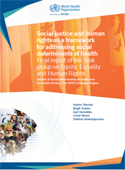Social justice and human rights as a framework for addressing social determinants of health: Final report of the Task group on Equity, Equality and Human Rights (2016)

Download
Most people place very high value on enjoying good health. Consequently, it is generally regarded as unfair that certain groups within society (such as people with lower socioeconomic status) do not enjoy the same level of good health as others. The unfairness or injustice is perceived to be even more acute if inequalities in health correspond with the unequal distribution of other socially produced goods such as income, access to educational opportunities, built environments and opportunities for social participation.
Based on these arguments, the public perception that health inequalities are unjust seems to be widespread across societies. Nevertheless, there is also much scepticism about the progress in implementing actual policies to reduce health inequalities. In other words, there seems to be a gap between rhetoric and performance. This report addresses two issues relevant for closing this gap in translating rhetoric into actual policies: why health inequalities are unjust and how normative arguments can be translated into policy, particularly by using the framework of the human right to health.



